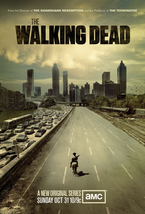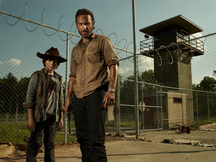
If you aren’t familiar with AMC’s television series The Walking Dead, I would suggest you catch up before the start of the next season in October. For fans of the show, Season 4 ended March 30th, and the next few months will be filled with anxious anticipation for the Season 5 premiere, which will reveal the fate of the show’s characters who are trying to survive in the midst of a full-blown zombie apocalypse.
While a show about zombies may seem a far cry from learning how to use an EHR meaningfully (or maybe not), there are some surprising lessons from the show that EHR Meaningful Users may find helpful (or at least interesting).
1. There is no escape for anyone. One thing that the characters learn quickly in The Walking Dead is that zombies are everywhere. Private homes or public buildings, underground or underwater, in the light of day or in the light of the moon — it doesn’t matter where the survivors seek refuge, zombies have a knack for showing up, and, frankly, it’s unnerving. For many healthcare providers, they feel the same way about “meaningful use”— it’s all consuming. Learning how to document in an EHR is tough enough, let alone having to document a certain way as to not alert the chomping mouths of the administrators and their weekly reports. So if there’s no escape, how do you survive? Mostly, surviving requires assimilation. The characters learn what it takes to kill the zombies while at the same time studying what triggers their attention and what it takes to hide from them. That’s not saying healthcare providers should learn how to kill or to hide from the administration (even if it does seem tempting at times). More along the lines of accepting your situation, studying what it takes to document correctly, and developing strategies to do it faster.
2. Even a prison can be a refuge. At the beginning of Season 3, after a long, hard winter of running on empty, Rick Grimes (the male protagonist of the series) and crew finally find a place to rest and refuel (and perhaps even reside?). And where else but a prison?! While we discover later in the series that the prison isn’t the perfect sanctuary, it does provide them with a temporary refuge where they have time to recover. Likewise, Meaningful Use may seem like a prison sentence for providers who have never had to document in an EHR before now, but in some ways, Meaningful Use has provided EHR users a means of protection in an industry that demands high standards be met for quality patient care. At least healthcare providers can be assured that when purchasing EHR hardware and software, the vendors must design them to meet Meaningful Use criteria in order to be a certified product. Additionally, while the Meaningful Use program isn’t perfect, participants do receive funding from the program, which should help them pay for the cost of implementation. For a time, their HIT initiatives are covered (or at least partially); every now and again a zombie sneaks into the prison.
While a show about zombies may seem a far cry from learning how to use an EHR meaningfully (or maybe not), there are some surprising lessons from the show that EHR Meaningful Users may find helpful (or at least interesting).
1. There is no escape for anyone. One thing that the characters learn quickly in The Walking Dead is that zombies are everywhere. Private homes or public buildings, underground or underwater, in the light of day or in the light of the moon — it doesn’t matter where the survivors seek refuge, zombies have a knack for showing up, and, frankly, it’s unnerving. For many healthcare providers, they feel the same way about “meaningful use”— it’s all consuming. Learning how to document in an EHR is tough enough, let alone having to document a certain way as to not alert the chomping mouths of the administrators and their weekly reports. So if there’s no escape, how do you survive? Mostly, surviving requires assimilation. The characters learn what it takes to kill the zombies while at the same time studying what triggers their attention and what it takes to hide from them. That’s not saying healthcare providers should learn how to kill or to hide from the administration (even if it does seem tempting at times). More along the lines of accepting your situation, studying what it takes to document correctly, and developing strategies to do it faster.
2. Even a prison can be a refuge. At the beginning of Season 3, after a long, hard winter of running on empty, Rick Grimes (the male protagonist of the series) and crew finally find a place to rest and refuel (and perhaps even reside?). And where else but a prison?! While we discover later in the series that the prison isn’t the perfect sanctuary, it does provide them with a temporary refuge where they have time to recover. Likewise, Meaningful Use may seem like a prison sentence for providers who have never had to document in an EHR before now, but in some ways, Meaningful Use has provided EHR users a means of protection in an industry that demands high standards be met for quality patient care. At least healthcare providers can be assured that when purchasing EHR hardware and software, the vendors must design them to meet Meaningful Use criteria in order to be a certified product. Additionally, while the Meaningful Use program isn’t perfect, participants do receive funding from the program, which should help them pay for the cost of implementation. For a time, their HIT initiatives are covered (or at least partially); every now and again a zombie sneaks into the prison.

3. We must have hope. If my favorite characters keep dying (in very gruesome, dismal ways) and the zombie apocalypse apparently has no end in sight, why do I and millions of other fans keep watching every Sunday night, glued to our sets for the full hour, the only show that, as one friend pointed out, is watched in real time versus hours or days later on the DVR (yes, we actually sit through the commercials)? Perhaps it’s because we still have hope—hope that those who are left will find a safe haven, a place to “live” once again rather than just exist. Better yet, hope for eradication of the virus that started the whole apocalypse and continues to be a constant threat to the survival of the human race. Perhaps the best lesson healthcare providers can take away from the show is they must have hope—hope that all of their efforts, that all of their struggles, that all of their time and money invested will pay off in the end and that patient care will be improved.
 RSS Feed
RSS Feed